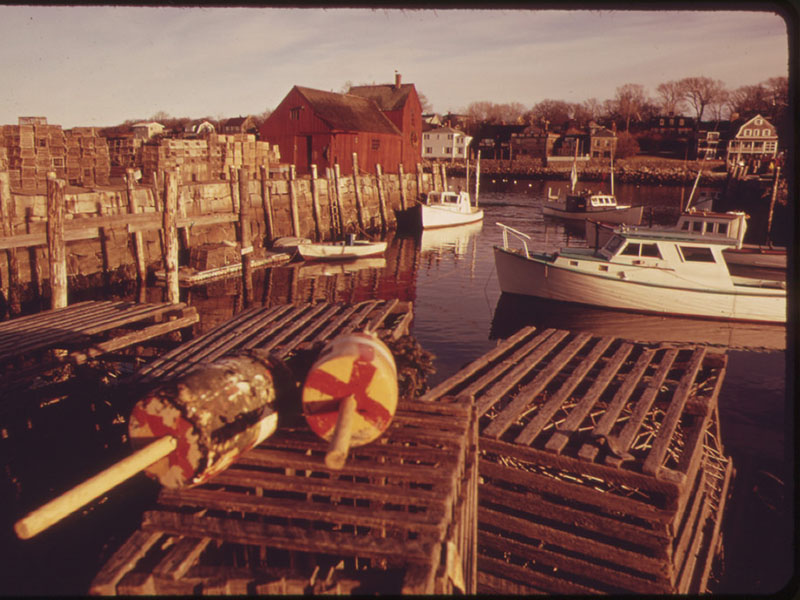It’s been a while since Red Bridges paid me $1 a day to bait lobster traps. Nine years old and not especially tall, I couldn’t reach deep in the bait barrel, so Red would pitchfork the redfish into a bushel basket for me. Between his having to do that and my eating half his lunch — unless he brought cold bean sandwiches — I was probably getting 99 cents more than I was worth.
Another benefit was cussing. Red was by no means vile in his use of language but he could cuss with the best of them and if, for example, our gear wound up with another fisherman’s, he would let loose with a stream I would later reprise for my friends. Of course, on the rare occasions his wife came along for the day, sitting in her lawn chair on the back deck, you’d have thought we were a couple of altar boys.
This was the 1960s. Lobstermen at Perkins Cove in Ogunquit, Maine, fished a couple hundred wooden traps, if that, from wooden boats. They built their own traps and knitted their own heads. Bait was $5 a barrel and the bait man delivered twice a week. Electronics typically consisted of a flasher, and not everyone had a radio.
Some things haven’t changed. Lobstering has always had pirates who harvest shorts and v-tails or regard buoy color as a notion whose significance varies with the visibility. In years past the state of Maine was seldom called in to adjudicate disputes. Fishermen sorted things out on their own in accordance with local tradition. In some cases, a word to the wise was enough, particularly if delivered by someone who might have been described as an “elder statesman.” Sometimes more assertive remedies were necessary. Occasionally, a dispute could result in an all-out trap war.
(For further reading in this area, try “The Lobster Gangs of Maine,” by James Acheson, available on Amazon.)
No more, says Maine’s Department of Marine Resources — not if it gets its way. The DMR wants to extend its oversight of the fishery by covertly installing tracking devices on lobster boats suspected of civil violations of fishery regulations. Under current law, it can do this in criminal cases, provided a judge signs off on a warrant. In civil cases, which include some fishery violations, fishermen must be given 24 hours’ notice of a warrant.
The convenience of this arrangement is not lost on civil violators. As a result, warrantless surveillance has the support of the Maine Lobstermen’s Association. David Cousens, the MLA’s longtime president, says there are fishermen who exceed the 800-trap limit, a civil violation, by a factor of two. “It causes a lot of bad feelings,” he said. In the lobster business, bad feelings have been known to get worse.
The Maine Lobstermen’s Union parts company with the MLA on this one, saying that the covert, warrantless installation of surveillance devices violates the Fourth Amendment. It is arguable whether the Fourth Amendment extends to civil cases. What is not arguable is that the restraint implicit in the requirement for a warrant is more than a legal trifle.
The concern isn’t lost on Patrick Keliher, the commissioner of Maine’s DMR. “An officer would need to establish probable cause for a violation,” he told a legislative hearing recently. “This would need to go far beyond dock talk, but actually demonstrate evidence of the likelihood of a violation.”
In effect, Keliher is calling for the same rigor that would be applied to securing a warrant in a criminal case. And in fact, earlier this year he said, “Another possible approach to this issue would be to continue to require the warrant from the court, but to provide an exception to the notice requirement for the civil violations that are of specific interest.”
This latter solution seems to me a win-win. The playing field gets leveled for the good guys, the resource is relieved of thousands of excess lobster traps, the MLU’s concerns get addressed, and the bad guys get their comeuppance.
Still, I’ll stop short of declaring total victory. The MLA’s embrace of more activist law enforcement reflects the evolving industry. The independence that characterized the old-timers was as much a part of lobstering as the wind and the tides. Red Bridges and his generation were independent fishermen. Today’s lobster catchers are independent businessmen.
I’m not sure Red would have been impressed. What he had to say about it, of course, would have depended on whether his wife was with us that day.







